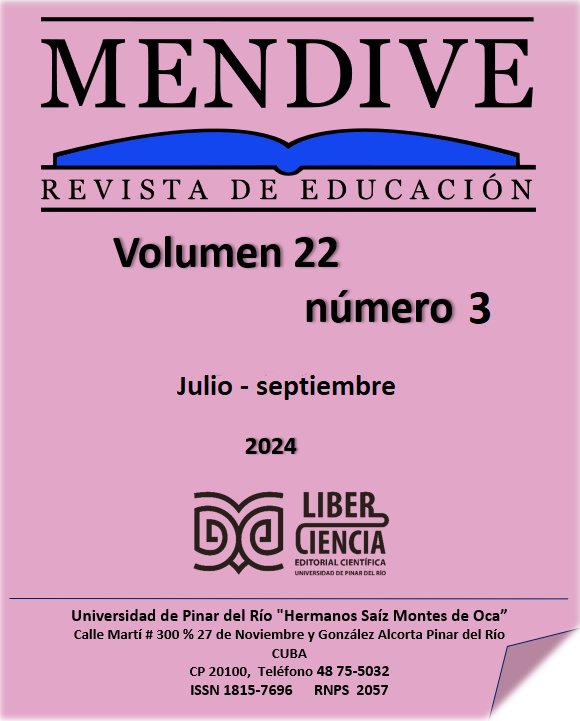Emerging technological transformations in police teaching-learning processes based on virtual reality
Main Article Content
Abstract
Global society is immersed in changes and transformations that affect institutional educational processes, due to emerging advances in science and technology. In this sense, the present research aimed to optimize the teaching-learning processes at the “Francisco de Paula Santander” General Police Cadet School (ECSAN), based on emerging technological transformations with the use of virtual reality simulators. A qualitative documentary analysis was carried out, based on the sources and the critical apparatus on the design of virtual reality scenarios as a successful experience in the ECSAN. An instrument was applied to collect information, as a survey, with 936 cadets from the school. In terms of results, as society transforms and students demand new methodologies and learning tools to acquire knowledge of the police profession, the need arises in the School to generate other learning and teaching scenarios that become an opportunity to connect informative content (theoretical, conceptual and doctrinal) with procedural content, based on a training model that encourages pedagogical interaction between knowledge, knowing how to do and being. In conclusion, it is important to maintain the use of ICT, as well as the permanent use of virtual learning scenarios, to generate a practical application of knowledge, allowing the resolution of problems according to the contexts and the various situations required by the police service.
Downloads
Article Details

This work is licensed under a Creative Commons Attribution-NonCommercial 4.0 International License.
References
Curcio, I. D. D., Dipace, A., & Norlund, A. (2016). Virtual realities and education.
Di Serio, A., Ibáez, M. B., & Kloos, C. D. (2013). Impact of an Augmented Reality System on Students' Motivation for a Visual Art Course. Computers & Education, 68, 586-596. http://dx.doi.org/10.1016/j.compedu.2012.03.002
Fajardo, E. (2019). Las nuevas tecnologías: ¿amenaza u oportunidad en el escenario educativo? Revista de la Facultad de Ciencias de la Educación, 4(1), 181-197. https://www.semanticscholar.org/paper/Las-nuevas-tecnolog%C3%ADas%3A-%C2%BFamenaza-u-oportunidad-en-Pascagaza/4766f77afb7263c679e031c9a836bedea0967453
Fajardo, E. y Cervantes, L. C. (2020). Modernización de la educación virtual y su incidencia en el contexto de las tecnologías de la información y la comunicación. Academia y Virtualidad, 13(2), 103-116. https://doi.org/10.18359/ravi.4724
Fernández, M. (2017). Augmented Virtual Reality: How to Improve Education Systems. Higher Learning Research Communications 7(1):1 DOI:10.18870/hlrc.v7i1.373 https://www.researchgate.net/publication/318615917_Augmented-Virtual_Reality_How_to_improve_education_systems
Mariscal, G., Jiménez, E., Vivas-Urias, M. D., Redondo-Duarte, S., & Moreno-Pérez, S. (2020). Aprendizaje basado en simulación con realidad virtual. Education in the Knowledge Society (EKS), 21, 15-15. https://doi.org/10.14201/eks.23004
Makransky, G., & Petersen, G. B. (2019). Investigating the process of learning with desktop virtual reality: A structural equation modeling approach. Computers & Education, 134, 1530. https://doi.org/10.1016/j.compedu.2019.02.002
Merchant, Z., Goetz, E. T., Cifuentes, L., Keeney-Kennicutt, W., & Davis, T. J. (2014). Effectiveness of virtual reality-based instruction on students' learning outcomes in K-12 and higher education: A meta-analysis. Computers & Education, 70, 2940. https://doi.org/10.1016/j.compedu.2013.07.033
Morán, J. (2015). Mudando a educação com metodologias ativas. Convergências midiáticas, educação e cidadania: aproximações jovens. Coleção Mídias Contemporâneas, 2(1), 15-33.
Plesoianu. G, Costin C, A. (2012). Experiential Learning An Effective Approach for Gathering Knowledge and Capabilities in Professional Career. 14(2):310-322. http://www.rmci.ase.ro/no14vol2/12.pdf
Terpstra, J., & Schaap, D. (2021). Politics of Higher Police Education: An International Comparative Perspective. https://doi.org/10.1093/police/paab050.
Unesco (2020) Education form Sustainable Development A roadmap. https://doi.org/10.54675/YFRE1448


